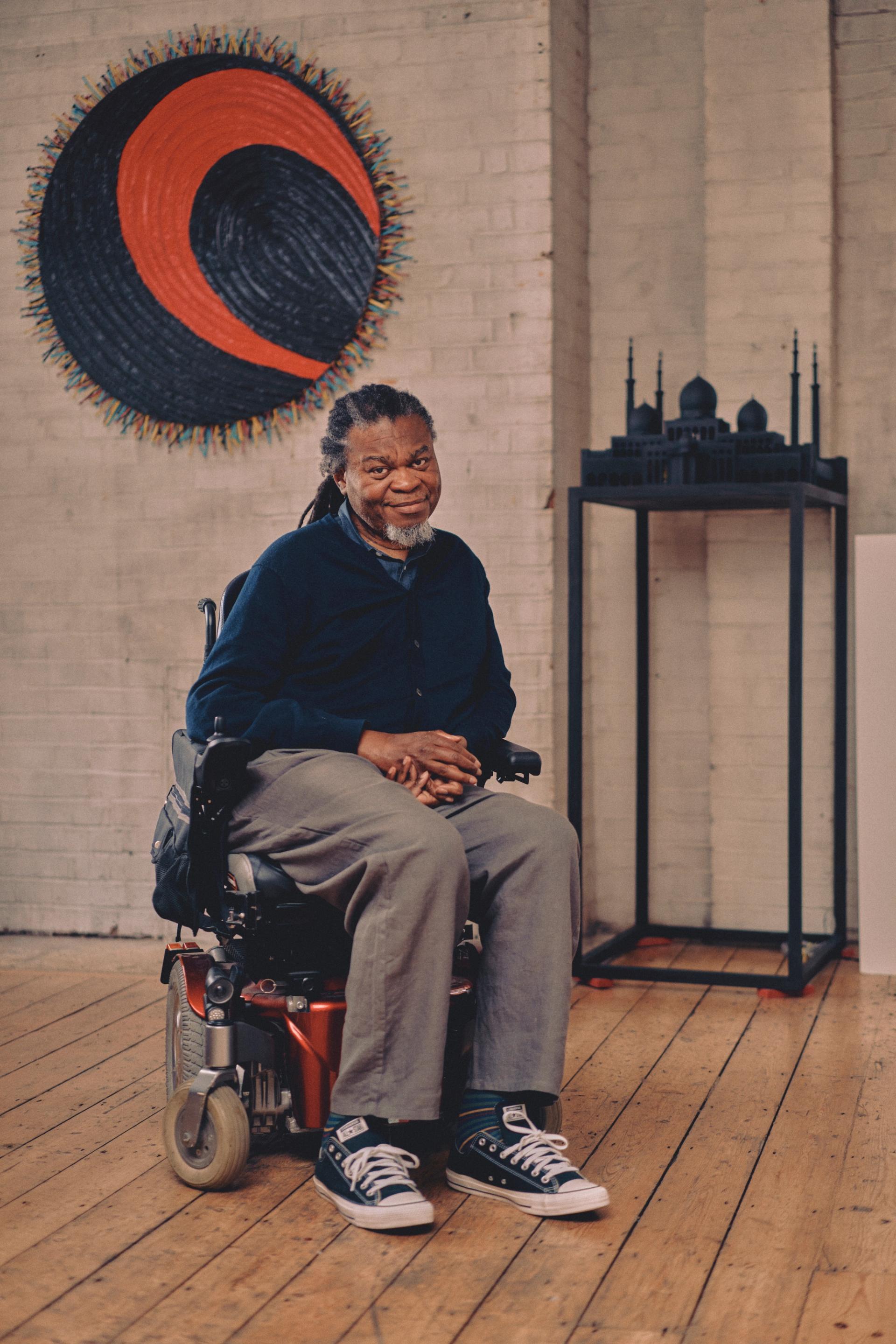We all need to find our own particular ways to address the climate and ecological crisis, and artists are no different. As this column has repeatedly shown, artists are often at the forefront of tackling environmental issues—both in their work and their deeds—and the ways in which they do so are as wide and varied as the human imagination.
Yinka Shonibare CBE RA is a case in point. Raised between London and Lagos, from early on in his career he has been all too aware of the close connections between environmental degradation, colonial expansion and trade. “I deal with post-colonialism in my work and the environmental issue is of course closely related to this,” he says. “The poorest countries emit the least pollution into the environment and they suffer the consequences disproportionately.”
In both his work and his wider initiatives Shonibare has always adopted a multi-pronged approach. With Black Gold 1, he was highlighting the grim marriage of colonialism and ecological devastation as far back as 2006. The large-scale painting installation features a giant black-painted “splat” shape, containing “bubbles” of his trademark Dutch wax fabric and organic plant forms. This throat-grabbing wall work was made with specific reference to Africa’s rich oil resources and environmental activism in Nigeria. It makes particular reference to the struggle of the Ogoni people against the despoiling of their lands by the Royal Dutch Shell company in the 1990s.
Two years later, the artist wasn’t pulling any punches with his ongoing series Climate Shit Drawing, which makes even more literal connections between economic systems, human greed and the growing climate emergency. Here, collaged flowers meticulously cut from Financial Times articles that bear headlines pertaining to rising fuel costs, float alongside detailed drawings of airplanes, helicopters and human faeces.
Now, in Suspended States, Shonibare’s current exhibition at London’s Serpentine Gallery, environmental concerns continue to form a significant strand within the many works on show. In some of his grapplings with the legacies of colonial power, Shonibare takes the language of hubristic imperial monumentality and then debunks it. This approach can be seen in the Decolonised Structures series, in which fibreglass, in the dense faux-batik patterning of Dutch wax fabric, adorns replica statues of the likes of Winston Churchill, Queen Victoria and Clive of India.
Installation view of Yinka Shonibare CBE: Suspended States at Serpentine South
© Yinka Shonibare CBE 2024. Photo: © Jo Underhill. Courtesy Yinka Shonibare CBE and Serpentine
However, in The African Bird Magic series of quilts that Shonibare began in 2023, he employs fabric in a different and more overtly environmentally explicit way. Through vivid appliqué and embroidery, he depicts the endangered birds of Africa, such as the Sokoe Scops Owl, Mauritius Fody and Comoro Blue Vanga. “We try to use recycled fabrics to make these works,” he says. “These quilt pieces don’t belong to Western, male dominated art history—they are craft and as such are a deliberate challenge to this system. They are also about a pre-industrial Africa, when people were more in harmony with nature and watched over what are now endangered species.”
These stitched images of birds on the verge of extinction are accompanied by African masks, a symbol of ancestors who were the custodians of the land before the arrival of European colonisers. According to Shonibare, these masks hold two meanings. They stand both as a reminder of imperial plunder and appropriation, and as more positive, celebratory “symbols of African empowerment to challenge the consequences of Western colonial industrialisation in the degradation of the African environment”.
With endearing candour Shonibare declares: “I’m no different to anyone else, I still have a lot of practices that are not entirely clean. At my stage in life it would be very hard to completely erase flying—I like travelling; like all of us. Some habits are very difficult to shake off.”
However, unlike many of his peers, in tandem with his art-making Shonibare also attempts to make a wider difference by developing a socially-engaged practice. He regards this to be just as important as his paintings, sculpture, prints, quilts and installations. “You can’t really separate art from life—and artists express what goes on in life,” he says. “My work has always been engaged with social issues—I want to engage people.”
In 2008 Shonibare opened Guest Projects, an artist’s studio and experimental space for the east London arts community. The venue was especially valuable after the financial crisis of the same year, acting as a creative crucible for early career artists, curators, producers and other creatives to test their ideas for free, and without judgement. Motivated by the success of Guest Projects, Shonibare then launched Guest Artist Space (GAS) Foundation in Nigeria in 2022.
This non-profit is devoted to supporting critical practices in the field of contemporary art, design, architecture, science, and—significantly—agriculture and ecology. GAS consists of a residency building located in Lagos, and the GAS Ecology Green Farm and Farm House in Ijebu Ode, three hours outside the city. Both the foundation and the ecology farm have already played host to more than 50 artists and figures from across disciplines, and feature prominently in the Serpentine show, in a space devoted solely to Shonibare’s social practice.
The artist was especially eager to acquire the 54-acre GAS Ecology Green Farm as part of his Nigeria-based foundation. This was, in his words, because “when I thought about setting up the GAS Foundation and residencies, I wanted the project to have relevance to current thinking, and the most pressing issue of our time is environmental. If we don’t start thinking about it we’re not going to be here in a few years time—if we don’t deal with these issues, art wouldn’t even be possible”.
To this end, the GAS Green Farm is both a working farm and a place for creativity and thought. “The farm is not that big. It’s the equivalent of about 54 football fields, but it’s about the principle of it,” Shonibare explains. “I realised the importance of researching and developing creative projects around nature, and the notion of food sustainability is especially important in Nigeria where they import a lot of food, even though the weather is good enough to grow much of the produce they fly in.” The farm therefore grows crops compatible with the local climate, including plantain, cashews and tomatoes. These crops are then processed and sold by the local community in the neighbouring village, thus offering them economic autonomy.

Yinka Shonibare CBE RA’s foundation and the ecology farm have played host to more than 50 artists and figures from across disciplines
Photography by Tom Jamieson. Image © Yinka Shonibare CBE and Tom Jamieson.
Yet it is equally important to Shonibare that the farm functions as “a platform for the exchange of ideas”. “There are artists who make art around the environment and I wanted them to have a context where they can do that kind of work if they wanted to,” he says. “It’s not just a farm. It’s a platform for engaging with pressing concerns around ecology.”
As well as inviting individual artists, scientists, performers and thinkers, the farm also hosts a wide—and ever expanding—-range of collaborations and partnerships, including the Stockholm School of Economics, and University of London’s Art for the Environment Residency Programme. “It’s as important for the international audience to go to Nigeria as it is for local people to interact with the international people who come,” Shonibare states.
The artist is well aware that the farm is a modest drop in the environmental ocean. He is also especially eager not to be seen as “a guy who is holier than thou, or who greenwashes things”. But, in his commitment to channelling considerable resources into providing platforms for “people to create good things–or at least try to,” he is doing more than many much better-heeled art world players.
“The root of all conflicts and prejudice is mainly ignorance, and cultural exchange helps to dissipate some of that ignorance,” he says. “It’s a way of working together, exchanging skills and empowering ourselves, and this is especially necessary around issues of climate change and sustainability. I think that through the work of the foundation there’s a lot we can achieve in a collective matter, rather than it being about just about me, me, me.”
- Yinka Shonibare CBE: Suspended States, Serpentine Gallery, until 1 September



